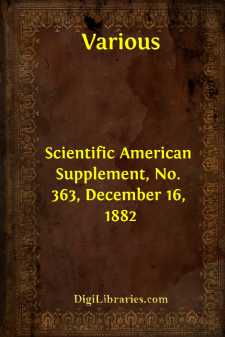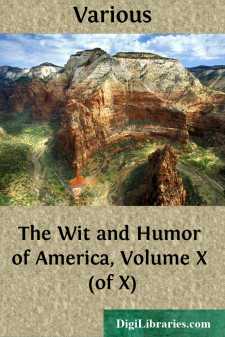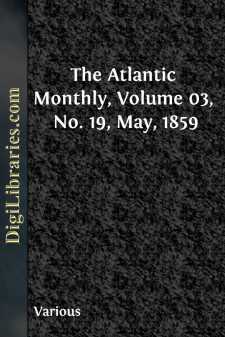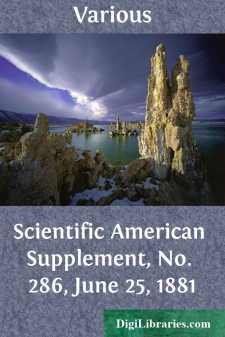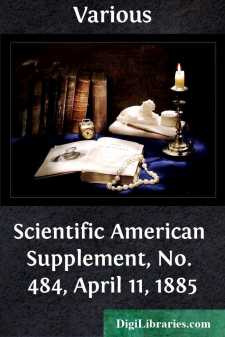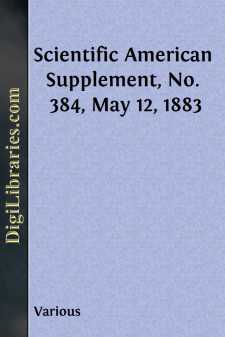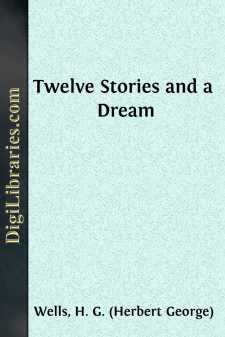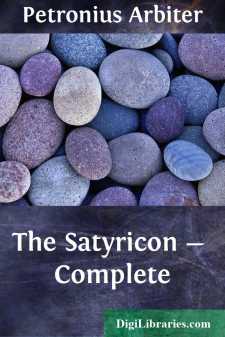Categories
- Antiques & Collectibles 13
- Architecture 36
- Art 48
- Bibles 22
- Biography & Autobiography 813
- Body, Mind & Spirit 141
- Business & Economics 28
- Children's Books 12
- Children's Fiction 9
- Computers 4
- Cooking 94
- Crafts & Hobbies 4
- Drama 346
- Education 46
- Family & Relationships 57
- Fiction 11826
- Games 19
- Gardening 17
- Health & Fitness 34
- History 1377
- House & Home 1
- Humor 147
- Juvenile Fiction 1873
- Juvenile Nonfiction 202
- Language Arts & Disciplines 88
- Law 16
- Literary Collections 686
- Literary Criticism 179
- Mathematics 13
- Medical 41
- Music 40
- Nature 179
- Non-Classifiable 1768
- Performing Arts 7
- Periodicals 1453
- Philosophy 64
- Photography 2
- Poetry 896
- Political Science 203
- Psychology 42
- Reference 154
- Religion 513
- Science 126
- Self-Help 83
- Social Science 81
- Sports & Recreation 34
- Study Aids 3
- Technology & Engineering 59
- Transportation 23
- Travel 463
- True Crime 29
Scientific American, Volume 17, No. 26 December 28, 1867 A Weekly Journal of Practical Information, Art, Science, Mechanics, Chemistry, and Manufactures.
by: Various
Categories:
Description:
Excerpt
Nitro-Glycerin.
Professor Doremus of this city was called as a witness at the inquest upon the bodies of the unfortunate persons killed by the recent explosion at Bergen, N.J. The Professor having previously analyzed some of the explosive mixture, testified as follows:—"I have subjected it to chemical analysis, and find it to correspond to the formula C_{6}, H_{3}, O_{3}, and NO_{5}; it is well made nitro-glycerin; the substance freezes at about 46; it is made to decompose in a very peculiar way; on moistening paper with it it burns with rapidity; it does not explode when red-hot copper is placed in it; we tried it with the most intense heat—we can produce with a galvanic battery with two hundred cells holding a gallon and a half each; some nitro-glycerin was placed in a cup and connected with one of the poles of the battery; through a pencil of gas carbon the other poles of the battery were connected with the glycerin, no explosion ensued; but when the point touched the britannia vessel the nitro-glycerin took fire, a portion burning and the rest scattering about; this is as severe a test as we can submit it to in the way of heat under the pressure of the air; we therefore would conclude that nitro-glycerin carried about exposed cannot explode, even if you drop a coal of fire into it; if the liquid is confined, or is under pressure, then an explosion will ensue; if paper be moistened with it and put on an anvil and a smart blow given with a hammer, a sharp detonation ensues; if gunpowder or the fulminates of mercury, silver or gun-cotton be ignited in a vacuum by a galvanic battery, none of them will explode; if any gas be introduced so as to produce a gentle pressure during the decomposition, then a rapid evolution of gases will result; the results of decomposition in a vacuum differ from those under atmospheric pressure or when they are burnt in a pistol, musket, a cannon, or in a mine; where we have little or no pressure it is difficult to get these substances to burn rapidly; nitro-glycerin is more difficult to explode than powder; in many respects it resembles gun-cotton which is made in a similar way; if gun-cotton be immersed in the proto-chloride of iron it turns into common cotton; the same experiment was tried with nitro-glycerin by mixing it with proto-chloride of iron, and it reverted into common glycerin; there are four well known varieties of gun-cotton made by employing acids of different strengths; they differ in chemical composition and properties, as well as in their explosive qualities; the late Minister of War in Austria in 1862 stated to me that he had ordered four hundred cannon for gun-cotton, and six months after he stated that he had ordered all the cannon to be changed and adapted to powder, in consequence of spontaneous combustions; much less is known of nitro-glycerin than of gun-cotton, and probably several varieties of this article may be formed as of gun cotton; this would explain cases of spontaneous explosion; if the nitro-glycerin is not carefully washed to get rid of the acid, a gradual decomposition will ensue, producing gases, which, if the vessel be closed, will explode; my opinion is that nitro-glycerin should be used in the most careful hands; do not think I would put it in the hands of a common laborer for blasting purposes; it is less dangerous in a frozen than a liquid state; I think concussion would explode frozen nitro-glycerin....



